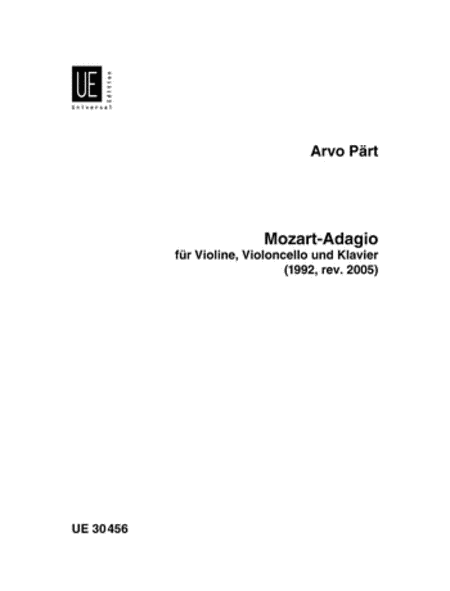Details
Description
SKU: PR.UE030456
Composed by Arvo Part. World Premiere: in Helsinki / Finland; by the Kalichstein-Laredo-Robinson Trio. Set of Score and Parts. With Standard notation. Composed 1992/2005. Duration 6 minutes. Universal Edition #UE030456. Published by Universal Edition (PR.UE030456).ISBN 9783702430016. UPC: 803452055075.
Arvo Part's Mozart-Adagio (1992) was composed for the Kalichstein-Laredo-Robinson Trio on commission by the Helsinki Festival, where it was premiered. The piece is in memory of Oleg Kagan, who was a friend of Arvo Part's and one of Russia's leading violinists. Kagan had a special affinity with the music of Mozart and the composer memorialises the violinist by transcribing one of the most affecting movements of the youthful composer's piano sonatas, the Adagio from the Sonata in F Major, K. 280. Arvo Part's Mozart-Adagio is neither an arrangement nor a collage. Part's approach to the original work is not a playful one (as it was with his Bach-inspired piece Wenn Bach Bienen gezuchtet hatte) - rather, it is cautious and respectful. Aspects of Mozart's composition and Part's Tintinnabuli style are in balance so that there emerges a spiritual encounter between the 18th and 20th centuries. To the original, the composer adds a modest introduction, interlude, and coda, as well as a restrained and ongoing commentary. The introductory and concluding frame consists of the simplest material - cello and violin playing discrete single notes in a humble duet of seconds and thirds. For the commentary, the composer takes the interval of Mozart's preoccupation in this movement, the minor second, and peppers the texture with this dissonant sonority. In lamenting the loss of a friend, Arvo Part seems to take the dissonance that Mozart uses so sparingly and makes this symbol of sorrow permeate, inescapably, the entire piece.

 Share
Share